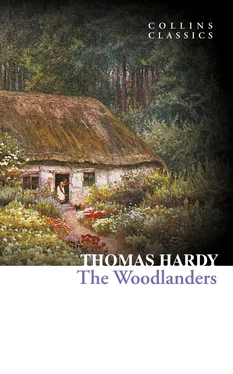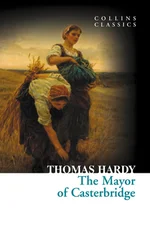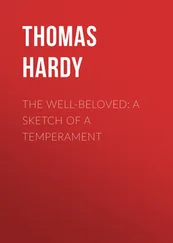In many respects the literature of Thomas Hardy is quintessentially English in tone and content. His stories are set in the deepest rural and bucolic southwest, where time attempts to stand still, preserving an English idyll that was worlds apart from the industrialization of the 19th century. For this reason his novels are described as belonging to the genre of ‘naturalism’.
Hardy was born and bred in Dorsetshire (now known simply as Dorset) and that is the epicentre of his constructed fictional world – one that is half imagined, half real, for he substitutes the actual names for places with alternatives conjured from his own mind. Hardy was primarily concerned with the innate nature of personalities in his literature. He ascribed each character with a personality type which largely predetermined their fate. While other authors, such as Charles Dickens, conveyed the idea that people can learn from their mistakes and change, Hardy showed the opposite. For Hardy, people never really learn the error of their ways and fate will deal them their hand in proportion to their level of selfishness, vanity, pride, foolishness, arrogance, unkindness or other failing. In some cases Hardy even resorts to having troublesome characters killed off or removed to prison in order to restore harmony. In this way he gives the more deserving the opportunity to alter their circumstances for the better.
One might think that Hardy was religious, given this moral and ethical filter, but he wasn’t particularly interested in religion. He was more taken by the idea of allowing his characters to express superstitions and supernatural beliefs. In this regard he was really adopting the view of the anthropologist, who remains necessarily impartial on matters of belief, so that they can study people with neutrality. His work is also filled with subtle allusions to Classical references, which he used to underpin central characters.
Hardy used to search for events reported in newspapers and often used them in his plots. It wasn’t so much that he lacked the imagination to think up ideas, but that he wanted to inject a sense of realism by introducing elements that simply would not have occurred to him. Real life can sometimes be stranger than fiction.
In Far From the Madding Crowd , published in serial form in 1874, Bathsheba is the beautiful female protagonist and it is through her experiences that Hardy exposes his feelings on romantic love and the inconsistency and destruction that can be caused by relationships. However, the central concern is Hardy’s preoccupation with the modernity and industrialisation of society. Many of his texts are set in rural locations and Hardy details the dialects, landscape and people of the English countryside to try and preserve that history and endangered way of life. Central to Hardy’s overall ambition was to show that living people are only ever custodians of the world for future generations. Dorset is filled with ancient sites of human activity and prehistoric evidence of a past without humanity. Hardy wanted to make it clear that we each have a window of opportunity in life to make our mark. That is why he had little time for people whom he considered to be fatuous or self interested, because he was acutely aware that it is the impression that we make on others and in their memories that counts the most, both during life and after death.
Apart from anything else, Hardy had an eye for the tragedy of life. He was a humanist, who cared about the underdog and expressed this by dealing with those who were more privileged in his prose. His own life was not entirely filled with happiness, as he became estranged from his first wife and was then deeply affected by her death. Many of his female characters have a dangerous beauty to them, suggesting that Hardy’s view of women was perhaps coloured by his own experience and that he felt men fall for the charm and allure of women, but end up beguiled and unhappy as the result of their infatuation.
The rambler who, for old association or other reasons, should trace the forsaken coach-road running almost in a meridional line from Bristol to the south shore of England, would find himself during the latter half of his journey in the vicinity of some extensive woodlands, interspersed with apple-orchards. Here the trees, timber or fruit-bearing, as the case may be, make the wayside hedges ragged by their drip and shade, stretching over the road with easeful horizontality, as if they found the unsubstantial air an adequate support for their limbs. At one place, where a hill is crossed, the largest of the woods shows itself bisected by the high-way, as the head of thick hair is bisected by the white line of its parting. The spot is lonely.
The physiognomy of a deserted highway expresses solitude to a degree that is not reached by mere dales or downs, and bespeaks a tomb-like stillness more emphatic than that of glades and pools. The contrast of what is with what might be probably accounts for this. To step, for instance, at the place under notice, from the hedge of the plantation into the adjoining pale thoroughfare, and pause amid its emptiness for a moment, was to exchange by the act of a single stride the simple absence of human companionship for an incubus of the forlorn.
At this spot, on the lowering evening of a by-gone winter’s day, there stood a man who had entered upon the scene much in the aforesaid manner. Alighting into the road from a stile hard by, he, though by no means a “chosen vessel” for impressions, was temporarily influenced by some such feeling of being suddenly more alone than before he had emerged upon the highway.
It could be seen by a glance at his rather finical style of dress that he did not belong to the country proper; and from his air, after a while, that though there might be a sombre beauty in the scenery, music in the breeze, and a wan procession of coaching ghosts in the sentiment of this old turnpike-road, he was mainly puzzled about the way. The dead men’s work that had been expended in climbing that hill, the blistered soles that had trodden it, and the tears that had wetted it, were not his concern; for fate had given him no time for any but practical things.
He looked north and south, and mechanically prodded the ground with his walking-stick. A closer glance at his face corroborated the testimony of his clothes. It was self-complacent, yet there was small apparent ground for such complacence. Nothing irradiated it; to the eye of the magician in character, if not to the ordinary observer, the expression enthroned there was absolute submission to and belief in a little assortment of forms and habitudes.
At first not a soul appeared who could enlighten him as he desired, or seemed likely to appear that night. But presently a slight noise of laboring wheels and the steady dig of a horse’s shoe-tips became audible; and there loomed in the notch of the hill and plantation that the road formed here at the summit a carrier’s van drawn by a single horse. When it got nearer, he said, with some relief to himself, “’Tis Mrs. Dollery’s—this will help me.”
The vehicle was half full of passengers, mostly women. He held up his stick at its approach, and the woman who was driving drew rein.
“I’ve been trying to find a short way to Little Hintock this last half-hour, Mrs. Dollery,” he said. “But though I’ve been to Great Hintock and Hintock House half a dozen times I am at fault about the small village. You can help me, I dare say?”
She assured him that she could—that as she went to Great Hintock her van passed near it—that it was only up the lane that branched out of the lane into which she was about to turn—just ahead. “Though,” continued Mrs. Dollery, “’tis such a little small place that, as a town gentleman, you’d need have a candle and lantern to find it if ye don’t know where ’tis. Bedad! I wouldn’t live there if they’d pay me to. Now at Great Hintock you do see the world a bit.”
Читать дальше












